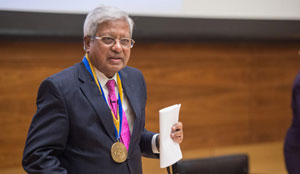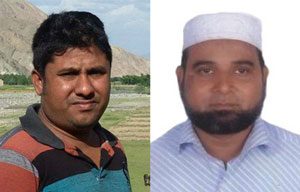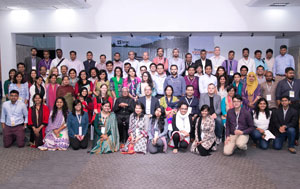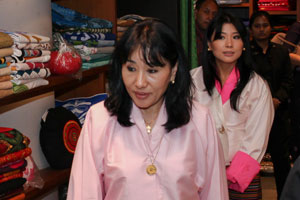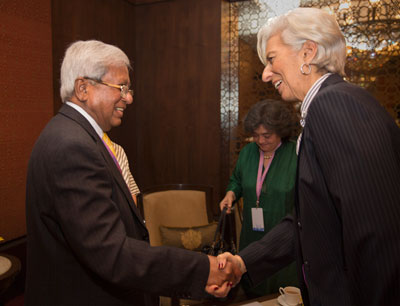
English (961)
Children categories
Sir Fazle Hasan Abed receives Thomas Francis, Jr. Medal
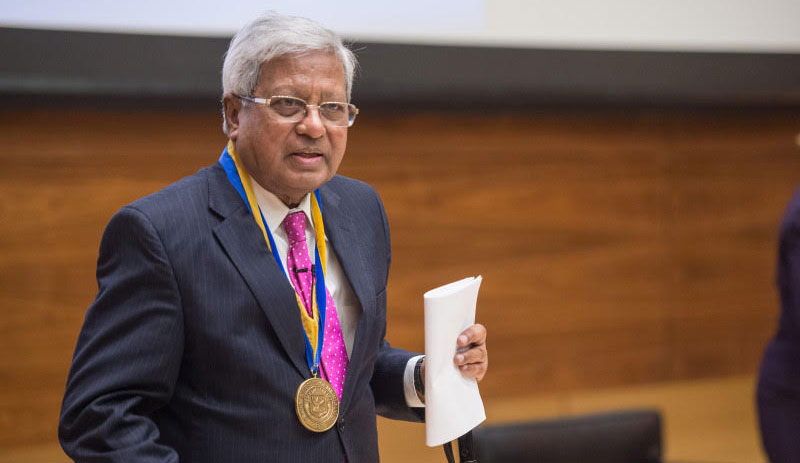
Sir Fazle Hasan Abed, KCMG, founder and chairperson of BRAC, was given the Thomas Francis, Jr. Medal in Global Public Health award by the University of Michigan. Mark Schlissel, president of University of Michigan presented the medal at a ceremony at the Ross School of Business on April 6, 2016.
Sir Fazle has been recognised for his advancement of global public health and work to establish a healthier future for people living in poverty worldwide. The medal, periodically awarded to a global leader whose work addresses the most pressing global health challenges, honours the legacy of the University of Michigan epidemiologist who mentored Dr Jonas Salk in his development of the polio vaccine.
"It is indeed a great honour to receive the Thomas Francis, Jr Medal in Global Public Health," said Sir Fazle at the award ceremony. "It gives me tremendous pleasure and I thank the University of Michigan for bestowing this prestigious award on me."
"In global development, it is not a lack of new and bright ideas that is impeding progress but rather our ability to implement these ideas well, effectively and at scale," said Sir Fazle. "There is much excitement today about the potential of new technology to end human poverty. This can make us forget that many solutions already exist. We can reach millions more today by focusing less on 'what' and more on 'how'."
In the 1970s, BRAC pioneered a new approach to treating diarrheal disease in Bangladesh. Known as Oral Rehydration Therapy (ORT), BRAC reached 12 million mothers almost entirely through person-to-person education, revolutionising health delivery in the country. Bangladesh now has the world's highest ORT usage rate, providing a case study in how to do a good thing better. In addition, between 1990 and 2011, Bangladesh saw a two-thirds reduction in mortality rates for children under the age of five. As a result, the country met the 2015 health standard set by the United Nations.
Today, BRAC breaks the cycle of contamination caused by limited access to toilets, latrines and safe water sources, especially in rural areas. Nearly one in three people worldwide – 2.5 billion – don't have access to adequate sanitation and nearly one in nine people – 800 million – don't have access to clean water.
By focusing on innovation, technical assistance, and community-based education, BRAC water and sanitation for health (WASH) committees have reached 38 million people, largely in rural areas of the country.
BRAC officials abducted in Afghanistan have been released
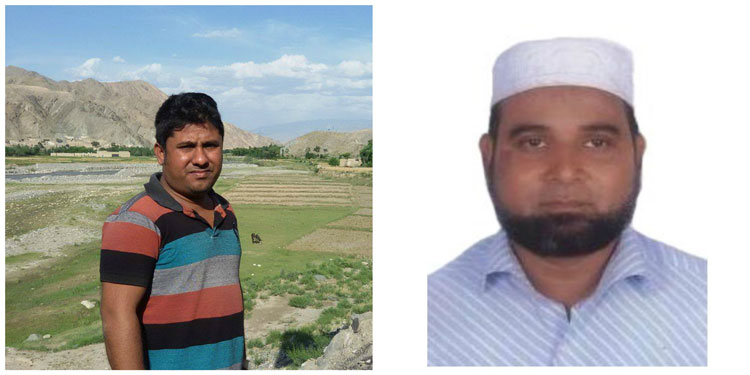
BRAC Afghanistan's staff KM Sirazul Islam (left) and Mohammad Swakat Ali (right)
Two Bangladeshi BRAC officials abducted in Afghanistan have been released after 18 days. Both Haji Swakat (50), and Md Sirajul Islam Sumon (37) returned unharmed to BRAC Kabul office on the morning of April 4.
Regional director of BRAC International, Asia, Jalal Uddin Ahmed said, "The release was ensured through the mediation of the local Surah leaders. We are very happy on their safe return. Both have spoken to their respective families in Pabna." Jalal Uddin Ahmed went to Kabul right after the abduction on 17 March.
Executive director of BRAC International Faruque Ahmed said, "We are relieved that our colleagues are safe and unharmed. From the very beginning ensuring their safe release was our top priority and I am glad that we have been able to achieve this. We are grateful to the families for their patience during the last two weeks." He also thanked both the governments of Afghanistan and Bangladesh, provincial governors, police and Surah leaders of Baghlan and Kunduz provinces for their relentless support in this critical time.
Haji Swakat and Md Sirajul Islam Sumon were abducted from Kunduz, Afghanistan on 17 March on their way back to Baghlan office after a field visit.
BRAC holds Frugal Innovation Forum 2016
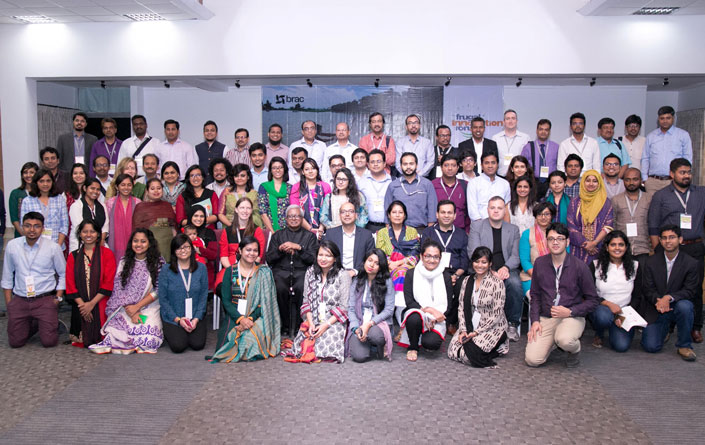
BRAC held the fourth Frugal Innovation Forum from 23-24 March 2016 in Savar, Bangladesh with the theme of scaling resilience. The forum showcased financial, social, and technological innovations that non-governmental organisations and other implementers are using to strengthen communities that are facing the effects of climate change.
The forum was designed to explore effective innovations and create opportunities for dialogue among leaders in the global south. Speakers from organisations that are building resilience in innovative ways, such as Goonj, iDE Nepal, The Mojolab Foundation, and Medic Mobile were featured in panel and plenary discussions. In addition, representatives from various grassroots organisations and thought-leaders on the subject including Ainun Nishat, Jaideep Prabhu, Rizwana Hasan and Arif Jebtik also presented and highlighted ways to build resiliency in the face of natural and man-made disasters.
“Resilience-building mindsets and creativity at the community and government level are necessary for communities to not only cope when faced with disaster, but to thrive,” Jaideep Prabhu said during the opening session. Mr. Prabhu said that top-down policies need to be balanced with grassroots, bottom-up solutions to build resiliency ahead of disaster.
The major sessions included financial innovations to foster household resiliency, innovations in adaptive livelihoods and agriculture, and also explored how policy can strengthen communities ahead of natural disasters in South Asia.
The two day long forum ended with a session with BRAC founder and Chairperson Sir Fazle Hasan Abed moderated by Mr Prabhu. The discussion mostly focused Bangladesh’s growth in the last few decades. Highlighting some of them Sir Fazle said that Bangladesh’s life expectancy at birth is higher than that of Pakistan and India although both the countries have higher per capita income than Bangladesh. But unfortunately, the country has a long way to go in terms of ensuring gender equality and meeting the growing demand of urbanisation.
Queen Mother of Bhutan visits BRAC
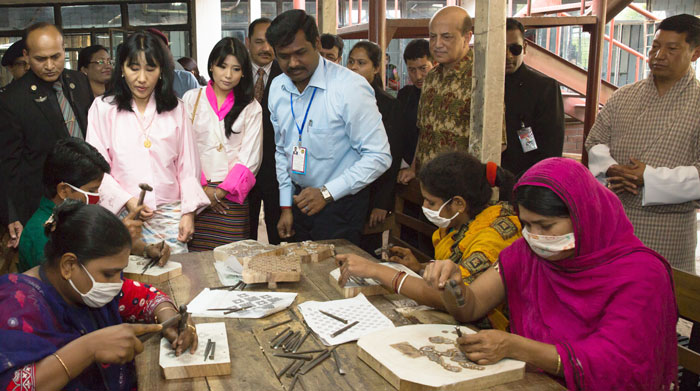
Her Majesty the Queen Mother Ashi Tshering Pem Wangchuck of Bhutan visits BRAC on her first trip to Bangladesh. As President of the Bhutan Youth Development Fund (YDF), Her Majesty is here for a five-day study trip to explore possibilities for collaboration between BRAC and YDF.
On Tuesday, 15 March, Her Majesty met with Sir Fazle Hasan Abed, the founder and chairperson of BRAC, at BRAC Centre. Admiring Bangladesh she said, “I am very impressed to see Bangladesh’s growth. I can see the discipline and it’s phenomenal.” She added, “We are very keen to collaborate with BRAC. It is remarkable that BRAC has touched so many lives and we have so much to learn from BRAC’s success.”
Thanking Her Majesty, Sir Fazle said, “Bangladesh is on the path to increase development growth rate. Last year it was 6% and we are hoping this year it would be 7%. But still 20% people live in poverty and BRAC is working to eliminate poverty and provide equal opportunity to all. We will be happy to collaborate with YDF”
In the evening, Her Majesty met the Honorable Prime Minister Sheikh Hasina at the Gonobhaban.
Her Majesty and YDF officials visited BRAC’s Ayesha Abed Foundation production centre and the Aarong Flagship Outlet on 16 March, Wednesday.
Her Majesty the Queen Mother was accompanied by Her Royal Highness Ashi Chimi Yangzom Wangchuck, the Vice President of the YDF, Ambassador of Bhutan to Bangladesh Her Excellency Pema Choden, YDF officials, and officials from the Royal Bhutanese Embassy in Dhaka.
Two BRAC officials abducted in Afghanistan

BRAC Afghanistan's staff KM Sirazul Islam (left) and Mohammad Showkat Ali (right)
18 March 2016, Dhaka. It is with great regret that we announce that Engineer Mohammad Showkat Ali, Chief Engineer, National Solidarities Programme and KM Sirazul Islam, Regional Accountant, Girls Education Challenge (GEC) project were abducted on 17 March 2016 from Shenowari of Baghlan e Markazi district under Baghlan province in Afghanistan. The incident happened when they were returning to Kunduz province BRAC office from a scheduled field visit.
BRAC is fully engaged in dealing with this crisis. BRAC Afghanistan authorities are in constant communication with the law enforcement agencies and the local administration and also has dispatched a team to Baghlan to coordinate the rescue efforts.
In immediate response, Ministry of Foreign Affairs of Bangladesh and Ministry of Interior of Afghanistan have assured their full cooperation.
BRAC officials in Bangladesh have been in communication with the families of Showkat and Siraz, keeping them informed of the latest situation and providing all necessary support.
BRAC has been in operation in Afghanistan, the first country presence of BRAC International, since 2002 helping the country to rebuild after the war. It currently runs programmes in health, girls education and is a partner of the Afghan Government in their National Solidarity Programme initiated to rehabilitate 5000 villages in Afghanistan. Its total budget for 2016 is about 15 million USD and it has a staff of 857 with about 61 of its staff being from Bangladesh and rest being from Afghanistan.BRAC's Afghanistan operation has reached 5.6 million people so far. For more information on our Afghanistan programme, click here.
BRAC is working all out to ensure a safe and speedy release of its abducted staff members.
Safe Spaces for Women at Workplace
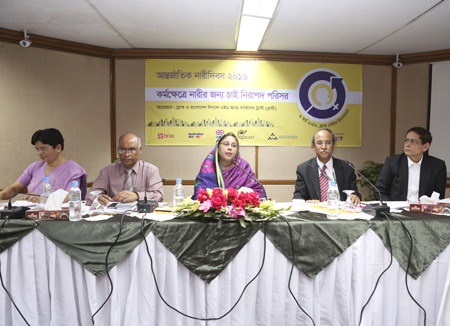
“Ensuring safety at workplace can help increasing women’s participation in the working sector” -said state minister of MoWCA Begum Meher Afroze Chumki, MP
State minister for Ministry of Women and Children Affairs (MoWCA) of Bangladesh Government, Begum Meher Afroze Chumki, MP, emphasised on women’s safety at work place to increase women’s participation, at a national dialogue today. The dialogue titled “Safe Spaces for Women at Workplace” was jointly organised by BRAC and Bangladesh Legal Aid Services Trust (BLAST) to mark International Women’s Day 2016.
As more women are participating in work outside home than ever before, ensuring safety for women at their workplaces has now become one of the most pressing agendas. Although the High Court issued a directive in 2009 to prevent and provide protection against sexual harassment at all workplaces, compliance with this directive is still not up to the mark. The dialogue was organised to start a conversation among private sector organisations to address the issue.
Barrister Sara Hossain from BLAST highlighted the nature of sexual harassment and what are the barriers for women to complain against it. She also put emphasis on the high court directive on sexual harassment redressal in her presentation. She said, “Even after seven years of the high court directive on sexual harassment redressal, it has not been made a law. In addition to this, the conditions or exact penalty in case of non-compliance with the directive is still not clear.” In her presentation she also stressed that the guideline only talks about the women, there is no mention of the third gender.
Maheen Sultan, visiting fellow of BRAC Institute of Governance and Development made a presentation on “Addressing sexual harassment in the garments sector: Good practices and findings”.
BRAC’s programme head of human rights and legal aid services (HRLS) Sajeda Farisa Kabir’s presentation addressed BRAC’s experience and learning in Addressing sexual harassment in the workplace. BRAC has more than a decade of experience in addressing sexual harassment issues at workplace, providing support to its 112,934 national staff, working in 64 districts and more than 8,000 staff working in 11 countries.
Present at the event were representative from private sector organisations like Nestle Bangladesh, Afroz, Incepta. The dialogue was moderated by BRAC's executive director Dr Muhammad Musa.
Sir Fazle joins Advancing Asia conference in Delhi
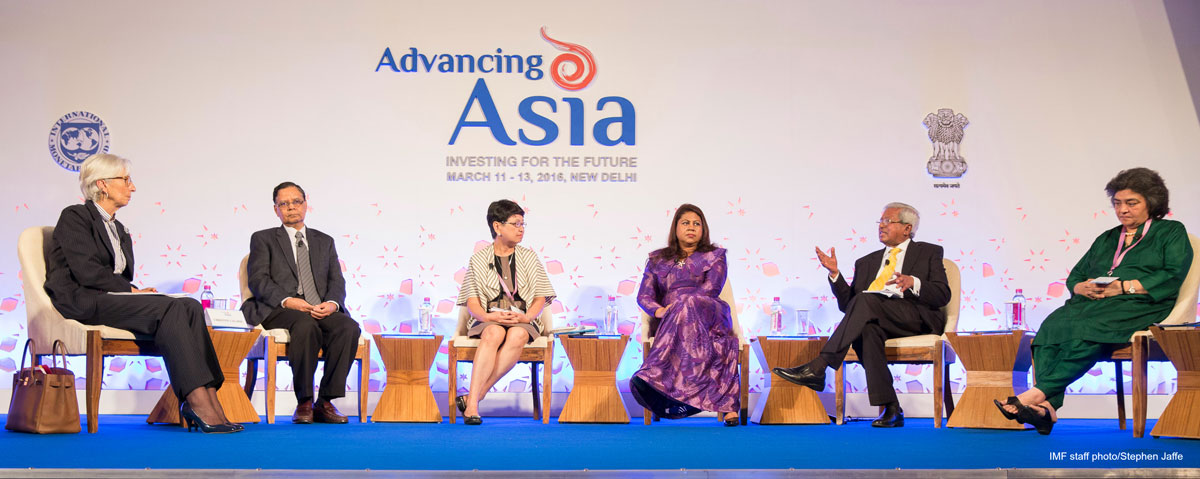
BRAC's chairperson Sir Fazle Hasan Abed joined a panel discussion today, 12 March, on Income Inequality, Demographic Change, and Gender at the three-day-long Advancing Asia conference in Delhi, India. He was joined by Milwida Guevara, CEO of Synergeia Foundation, Philippines, Arvind Panagariya, Vice Chairman of NITI Aayog India, Azeema Adam, Governor of Maldives Monetary Authority and Zia Mody, Partner, AZB and Partners, India. The session was moderated by Christine Lagarde, the managing director of the International Monetary Fund (IMF).
Watch the session here.
Learn more about Advancing Asia Conference here.
Closing the Gender Gap: Lessons from Africa
We hear that girls in Africa don’t have the same opportunities as boys to get a decent education, that discrimination is shutting women out of the jobs and assets they need to provide a better standard of living for their families, that the benefits of economic growth are being wiped out because women are having too many children, and that thousands of women are dying in childbirth because they don’t have access to basic healthcare.
While all of these things are true, they also hide something that you rarely hear – that Africa has been making significant progress and even has a thing or two to teach the rest of the world. read more
The skilled girl effect: Worth more than the US and Chinese economies put together
A computer whirs to life in a small shop in Bangladesh’s chaotic capital Dhaka. Outside rickshaw drivers bargain for fares and street sellers call out the day’s fish prices. The phone rings. Hasna Hena, 15, takes the call in one hand, her other flying over the track pad to open Photoshop. It’s another new client needing a poster design. read more
Primary Schools in Bangladesh to Go Digital, Reaching 20 Million Students
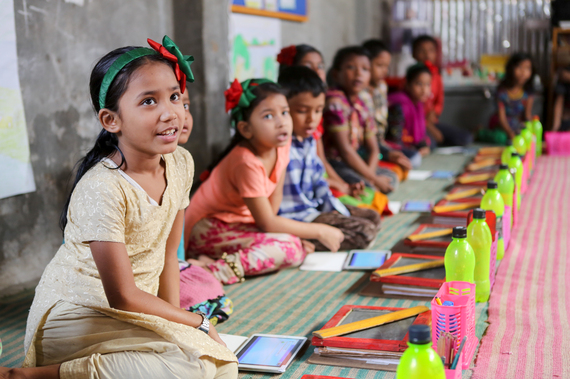
A Huffington Post article
By Zunaid Ahmed Palak and Safiqul Islam
The Bangladesh Prime Minister this week launched the latest addition to the country's digital curriculum to reach 20 million primary school students, continuing to revolutionise one of the most under-resourced education systems in South Asia.
As governments worldwide scramble to cultivate a generation of tech-savvy children, Bangladesh is continuing to push the boundaries of digital learning through interactive multimedia content. Even in the remotest corners of the country, the newest generation will now be using computers from their first year of school.
On 14 February, Prime Minister Sheikh Hasina launched interactive lessons for Grade 1-3, a joint initiative by the Government of Bangladesh, BRAC and Save the Children in response to the success of content previously developed by BRAC for Grade 6-10. By mid-2016, interactive lessons for Grade 1-10 (primary, junior and secondary education) will be accessible online on any device.
"Getting tech-based education to every corner of the country is a high priority of the government. Digital content contains lessons for all of us; it makes us all into teachers and we all become students," said the Prime Minister.
The 'tab school' in the slum
Korail, one of the largest slums in Dhaka, the capital of Bangladesh, is home to an estimated 40,000 people. It is never quiet. There is one building that has recently become particularly loud though. It is a rough tin shed, which rings with the sound of students laughing, talking, and singing their multiplication tables, along with animated voices for hours every day.
The shed, one of tens of thousands of schools run by BRAC, is known as the 'tab school'. In selected schools, BRAC has already started using tablets to access interactive multimedia digital learning content. Nur Nahar, the teacher in the school, laughs when she explains that her job is not only teaching, but also being taught. Her classes now revolve around digital media, which, prior to their introduction in her classroom, she had never even seen before.
"Digital content makes learning happen much faster," Ms Nahar said. "I have never seen many things in the world, and I never will. My students definitely have not either, but now they can see anything in the world in my class. Many topics, like mathematics and science, are hard to explain using just text. With pictures and videos, I have lots of new ways to show them why things happen and how. I had never heard of a tablet before this class. I was scared to use it but now I use it every day to explain things."
"Children are coming to school earlier and there are fewer students dropping out," she added. "Since this programme began, learning does not stop when class ends. It continues, every day, for so many more people than just my students. Children go home and show their families and everyone they know what they've learned on whatever device they can find. Every morning they come back knowing more than what I taught them so I have to work much harder than before to keep up."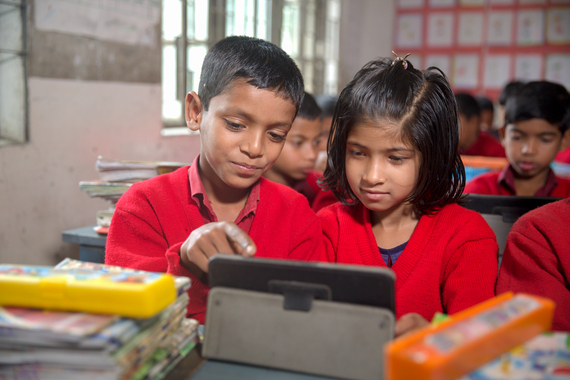
A gender-responsive, modern, secular curriculum for Digital Bangladesh
Digitising the national curriculum is acting as an impetus for reviewing and updating content. As lessons go online, a team of educators, policymakers and child psychologists ensure that all content is age-appropriate and children can identify with the animated characters.
In public schools, the content is being accessed on computers that the government has already placed in more than 5,500 digital classrooms across the country as part of its Digital Bangladesh initiative. In BRAC schools, where 1 million students are currently enrolled, the content is starting to be accessed on tablet devices.
Congratulating the government, BRAC founder and chairperson Sir Fazle Hasan Abed, KCMG said, "We introduced computer aided learning in 2005 to bring technology into the education sector. We appreciate the government taking it all over the country - it will change the future of education".
From Satkhira to Silicon Valley
The benefits of digital learning for Bangladesh's next generation will stretch far beyond the walls of Nur Nahar's classroom. In a country where students in developing countries like Bangladesh, the potential for information technology is huge. Approximately one in every four people live below the poverty line in Bangladesh, but more than 80 per cent use a mobile phone, and one in every three are online. The country is gearing up to move from manufacturing into the knowledge economy and IT is predicted to become its biggest source of foreign revenue. Bangladesh is already the home of, BKash, the service which Bill Gates himself now invests in, saying it will revolutionise banking for the poor. With students becoming familiar with computer-assisted learning from the first grade of primary school, and mobile-enabled devices rapidly becoming popular across the country, digital learning boasts a similar potential; to revolutionise education in Bangladesh. Every screen can become a space for families to experience animated learning.
As the online learning ecosystem is exploding universally, and Digital Bangladesh is bringing internet access to even the most remote corners of the country, students will be primed to tap into global opportunities. With global poverty being compounded by national inequality in almost every country, learner-centric education will build the confidence and creative mindset that students need to build their own path out of poverty or unemployment. The ultimate tool for leveling the playing field, there will be nothing stopping children in a flood-prone corner of rural Satkhira from learning computer programming to the same level of quality as children born in Silicon Valley.
Zunaid Ahmed Palak is the state minister, Ministry of ICT, Government of Bangladesh. He is the youngest minister in the history of Bangladesh.
Join the world’s biggest family

